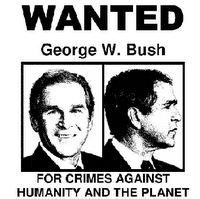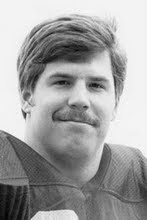Bush's Decency Highlights Democrats Incivility

This is an excellent read from a former fiberal.
By Seth Swirsky
One of the first things George W. Bush did after his inauguration on January, 2001, was invite Senator Edward M. Kennedy - along with his entire family - to the White House for a special screening of "13 Days," the hagiographic dramatization of Kennedy's brothers John and Robert's handling of the Cuban Missile Crises. Bush, famous for his bipartisan outreach during his eight years as governor of Texas (where he garnered 69 percent of the votes in his 1998 reelection), was beginning his presidency by reaching out again.
The symbolism could not have been more obvious. With the newly elected "compassionate conservative" hosting the aging lion of liberalism, Bush was keeping a campaign promise to be a "uniter, not a divider" and taking the first step to, as he promised, "return dignity" to the office.
Soon after, Bush pushed his attempts to unify America beyond symbolism by inviting Kennedy, the quintessential liberal and a longtime advocate of education reform, to the White House again, this time as a full partner in drafting the vital "No Child Left Behind" legislation.
Two years later, Kennedy repaid the president's generosity of spirit and action by taking the floor of the U.S. Senate to accuse him of being a liar by claiming that Bush had "cooked up the war (against Saddam Hussein's regime) in Texas." While Kennedy had every right to voice his passionate dissent of the war, his incivility toward the president stood in stark contrast to Mr. Bush's high-mindedness. When asked to respond to Senator Kennedy's no-holds-barred, no-proof-required attack, President Bush said, "I don't think we're serving our nation well by allowing the discourse to become so uncivil." The styles could not be more obvious: it was class versus crass.
It wouldn't be the only time prominent Democrats behaved rudely toward a president who treated them with respect. On June 14, 2004, President and Mrs. Bush invited Bill and Hillary Clinton to the unveiling of their portraits in the East Room of the White House. A few excerpts of the president's welcoming address once again show Bush to be a man with a warm heart and generous spirit:
"President Clinton and Senator Clinton, welcome home. It's great to see Chelsea. The fact that you survived your teenage years in the White House... speaks to the fact you had a great mom and dad. Thank you all for coming back...We're really glad you're here. As you might know, my father and I have decided to call each other by numbers. He's 41, I'm 43. It's a great pleasure to honor number 42. We're glad you're here, 42...Mr. Rodham did have the joy of seeing his only daughter become America's First Lady. And I know he would not be surprised to see her as she is today, an elected United States Senator, and a woman greatly admired in our country."
Since that evening, Senator Clinton has repaid the president's kindness towards her and her family by saying, among other mean-spirited things: "I sometimes feel that Alfred E. Neuman is in charge in Washington" and "I predict to you that this administration will go down in history as one of the worst that has ever governed our country." (The last said on Martin Luther King's birthday, a day that should symbolize a coming together of parties and people of diverse viewpoints).
The kindness President Bush showed former President Clinton takes on extra meaning when one remembers the cynical words Clinton had for then-governor Bush when Bush was running for President in 2000: "The message of the Bush campaign is just that, I mean: 'How bad could I be? I've been Governor of Texas. My daddy was president. I owned a baseball team.'" Only last year, Clinton went on to abrogate the unwritten rule between ex-presidents of not speaking ill of them, especially when overseas (no less, when we're at war). Clinton told a group of Arab students in Dubai that the United States made a "big mistake" when it invaded Iraq. Did the ex-president not know that his condemnation of the war, spoken in the heart of the Middle East, could damage the morale of the brave Iraqi people and frontline American troops who risk their lives everyday in the name of democracy? Clinton earned $300,000 for speaking against America's interests that day.
Despite both Clintons disrespectful comments, President Bush offered a contrast in style few could miss. During his 2006 State of the Union address, he offered nothing but gracious good humor when he said his father's "two favorite people" - Bill Clinton and himself - were turning 60. As laughter filled the Senate chamber, the camera recorded a stone-faced Hillary Clinton. At the very least, a polite smile would have sufficed, allowing Americans to see that their leaders can put politics aside for but a moment.
But the Democrats aren't able to put politics aside. They're too angry with President Bush for everything from winning the election in 2000 to having the gall to monitor terrorists' phone conversations. Even after the president shared credit with the Democrats on the reduction of crime and the lowering of welfare rolls and teenage pregnancies, the Democrats - in keeping with their "if it's bad for America, it's good for Democrats" theme - applauded enthusiastically only when Bush mentioned the failure of social security reform. Class versus crass.
The contrast becomes even clearer when one expands the field to include the First Lady and she who would be queen, Theresa Heinz Kerry. Can anyone imagine the dignified Laura Bush telling a newsperson to "shove it" or using the term "scumbags" in a taped interview as Heinz Kerry did during the 2004 campaign? Class versus crass.
And even as the body of Coretta Scott King lay in state, the Democrats could not resist using her funeral as a way of being uncivil to President Bush. Who can forget the Reverend Joseph Lowery choosing to eclipse what should have been a heartfelt eulogy in order to remind the audience that "We know now there were no weapons of mass destruction over there"? Or, ex-President Jimmy Carter,choosing the reflective occasion to hurl gratuitous remarks in the president's direction? Once again, President Bush took the high road, embracing Lowery and speaking dignified, respectful and healing words about Mrs. King. Class versus crass.
The president's demeanor, standing as it does in perfect counterpoint to that of his political adversaries, is one of the reasons Republicans control the House, the Senate and the White House, and, I predict, will continue to do so. Americans prefer nice people, because they recognize that a thriving civilization requires civil people.
President Bush had it right when he said, "America is a great force for freedom and prosperity. Yet our greatness is not measured in power or luxuries, but by who we are and how we treat one another." Now that's class.
Seth Swirsky is a hit songwriter and best selling author. He can be reached through his site, Seth.com

0 Comments:
Post a Comment
<< Home